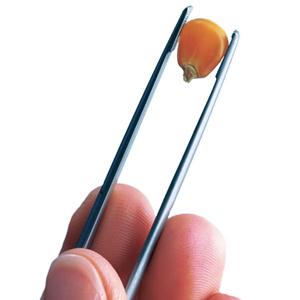Enogen corn, ICM technologies add value at Minnesota plant

PHOTO: Syngenta
November 28, 2018
BY Syngenta
A recent trial evaluating the use of Enogen corn enzyme technology with ICM’s Selective Milling Technology and Fiber Separation Technology successfully demonstrated that the technologies work well together, providing synergies that can bring higher ethanol yield and more robust starch-fiber separations. The technologies were tested at Corn Plus, a Minnesota-based dry grind ethanol plant.
Enogen corn is an in-seed innovation available exclusively from Syngenta and features the first biotech corn output trait designed specifically to enhance ethanol production. Using modern biotechnology to deliver best-in-class alpha amylase enzyme directly in grain, Enogen corn eliminates the need to add liquid alpha amylase. The product is rapidly gaining widespread acceptance because of the value it delivers to ethanol producers and the opportunity it provides corn growers to be enzyme suppliers for their local ethanol plants.
Advertisement
“Enogen grain works across a broad range of pH and temperatures, facilitating an unparalleled break in viscosity through unique enzyme activity and unmatched dosage rates,” said Dr. Miloud Araba, head of technical services for Enogen at Syngenta. “Breakthroughs in viscosity reduction can lead to unprecedented levels of solids loading, which directly contribute to increased throughput and yield, as well as significant cost savings from reduced natural gas, electricity and water use.”
“SMT and FST are two of ICM’s value-added, patented technology platforms,” said Steve Hartig, ICM vice president of technology development. “Both technologies are designed to help maximize production and minimize operational expense. SMT maximizes the amount of starch exposed for conversion to ethanol and oil available for recovery while preserving fiber for higher value platform applications. FST is a progressive pre-fermentation system that removes fiber prior to fermentation, allowing more fermentable carbohydrates to be loaded into each batch for fermentation.”
Advertisement
“Using Enogen corn, with its mode of action and high amount of expressed enzyme, brings a lower viscosity to the corn mash. The lower viscosity provides improved separation capability, leading to increased efficiencies when working in tandem with the SMT and FST systems,” Hartig added.
Related Stories
The U.S. Energy Information Administration maintained its forecast for 2025 and 2026 biodiesel, renewable diesel and sustainable aviation fuel (SAF) production in its latest Short-Term Energy Outlook, released July 8.
XCF Global Inc. on July 10 shared its strategic plan to invest close to $1 billion in developing a network of SAF production facilities, expanding its U.S. footprint, and advancing its international growth strategy.
U.S. fuel ethanol capacity fell slightly in April, while biodiesel and renewable diesel capacity held steady, according to data released by the U.S. EIA on June 30. Feedstock consumption was down when compared to the previous month.
XCF Global Inc. on July 8 provided a production update on its flagship New Rise Reno facility, underscoring that the plant has successfully produced SAF, renewable diesel, and renewable naphtha during its initial ramp-up.
The U.S. EPA on July 8 hosted virtual public hearing to gather input on the agency’s recently released proposed rule to set 2026 and 2027 RFS RVOs. Members of the biofuel industry were among those to offer testimony during the event.
Upcoming Events










